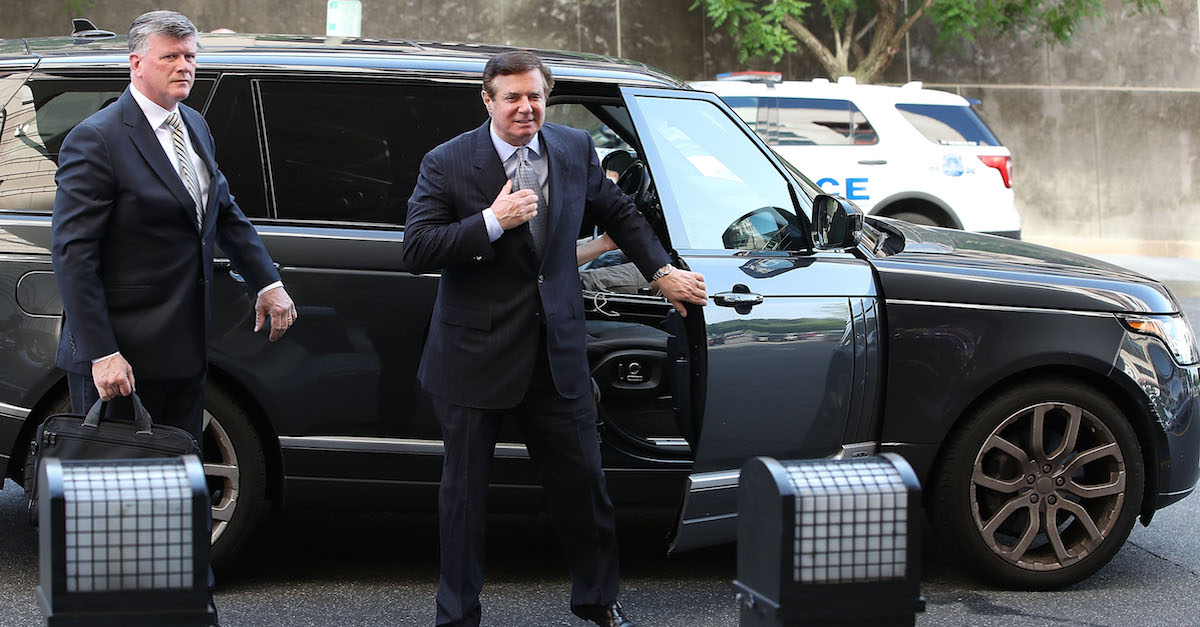
The sudden halt to the proceedings in the Paul Manafort trial on Friday has an explanation, in part. It turns out that there was a dispute over the admissibility of evidence.
The way that the story is recounted in Special Counsel Robert Mueller‘s Monday filing indicates that Judge T.S. Ellis III raised concerns about the admissibility of bank CEO Stephen Calk‘s statements and that Manafort’s defense “picked up” on that.
During a sidebar conference to discuss the admissibility of Calk’s statements under Fed. R. Evid. 801(d)(2)(E) (an issue that is not pertinent here), the Court expressed concern about the notion that TFSB could be defrauded when Calk, who ultimately approved these loans for TFSB, was going to approve the loans for personal reasons. Picking up on the Court’s comments, the defense suggested that Manafort could not have defrauded the bank if Calk knew Manafort’s representations were false. The Court agreed that it did not “see the materiality,” and it indicated that the defense could file a Rule 29 motion to argue that “there can’t be a conspiracy to commit a fraud if the elements of the fraud are not met, and materiality is one of the elements of the fraud, and . . . the government will not be able to show evidence of materiality sufficient to warrant the jury to consider that.”
This argument apparently went on far a while. Last Friday, no witness testimony was heard until after 2 p.m. There was an extended recess from the morning into the afternoon, and some of that apparently involved arguments over this issue. It’s not clear what else was discussed at this time, though there was some speculation that there was an issue with a juror not acting as the judge instructed.
In summary, the judge and Team Manafort expressed concerns of the relevancy of Calk’s statements in the bank and tax fraud trial. The idea being that Manafort could not have defrauded the Federal Savings Bank since the bank CEO, Calk, knew Manafort’s “representations were false” and approved loans anyway.
The government replied, “even if Calk intended to approve Manafort’s loans no matter what, that does not, as a matter of law, preclude a finding that Manafort’s misrepresentations were material under the bank fraud statute.”
The first major mention of Stephen Calk came one week ago, when he was mentioned in the same breath as the Trump campaign. It was the first time the Trump campaign had been referenced more specifically than “a presidential campaign.”
Calk and Manafort were in communication about a possible position on the Trump campaign, which Calk eventually got in the form of an economic advisory council spot. There were some questions raised about how the CEO of the Federal Savings Bank in Chicago was named to this position in August 2016.
Manafort left the Trump campaign that same month but Rick Gates, who testified against Manafort, stayed on. Prosecutors named Calk in the context of the campaign because of a possible pay-to-play scenario. Calk doled out a $9.5 million mortgage to Manafort despite risks and was rewarded. Prosecutors alleged that this was due to Calk’s other ambitions.
[Image via Mark Wilson/Getty Images]